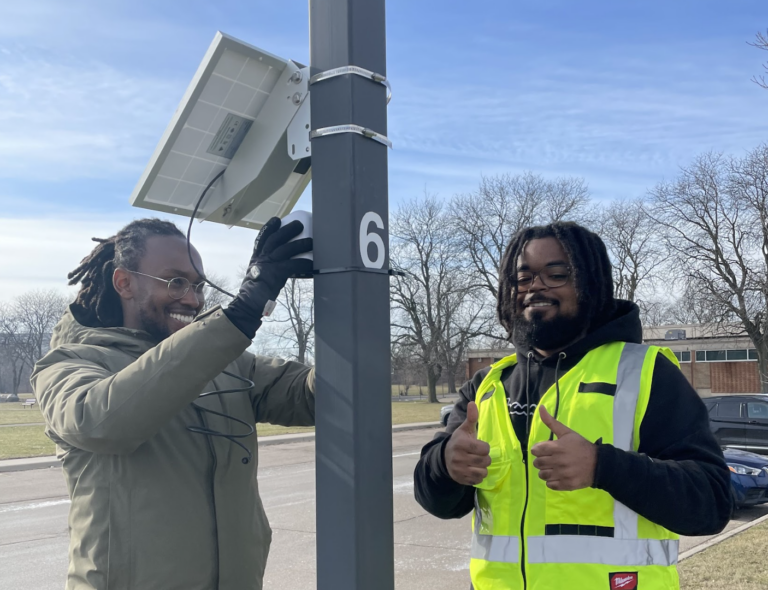
- Kim Kisner
- Business
- 11/26/2024
JustAir - Leveraging Tech and AI to Address Urban Air Quality Issues

JustAir, a Detroit-based startup cofounded by Darren Riley leverages data and technology to provide hyperlocal air quality insights, largely in urban areas. By deploying a network of air monitors, JustAir delivers real-time data that communities, policymakers, and environmental justice groups can use to push for meaningful action. With funding from initiatives that include Google for Startups Black Founders Fund, the company is building systems that aim to transform how cities like Detroit manage air quality challenges.
SBN Detroit interviewed Riley to learn about the broader implications of air quality monitoring, the challenges of implementing these systems, and how accessible data can drive public health improvements and policy changes.
Q: Why is air quality monitoring critical in urban environments like Detroit?
A: Detroit has a history of industrial pollution and high traffic volumes, especially in areas like Southwest Detroit, where I live. These factors contribute to some of the worst asthma rates in the country.

Traditionally, air quality data has been collected on a regional level, offering only a broad overview. But air pollution isn’t uniform across a city – it can vary dramatically from one block to the next. Localized data helps us understand where the worst impacts are happening, who is most affected, and when conditions are at their worst. This kind of granular information is essential for designing targeted interventions going forward.
Q: How does air quality monitoring technology work?
A: Traditional air monitoring relies on a handful of monitors spread across a large area, often providing limited insights. Our software facilitates and integrates multiple air monitors within a single area, sometimes scaling up to 50 or 75 units. These monitors collect data in real time, creating a detailed picture of air quality at a hyperlocal level.
We don’t manufacture the monitors ourselves – we work with partners to deploy them. Our software acts as the brain, aggregating data and managing the network. The idea is to provide actionable insights that can help residents, and, also down the road, policymakers and stakeholders in cities like Detroit better understand their air quality challenges and begin to determine how to better manage them.
Q: What is an example of your work in Southeast Michigan?
A: We have a three-year contract with Wayne County, which, before this partnership, had just seven or eight monitors managed by EGLE (Michigan Department of Environment, Great Lakes, and Energy). We added 100 monitors across the county so now every community has at least one monitor. Residents can sign up to get alerts – they can subscribe to individual monitors in their area or around a particular school or place of worship, etc. They can set when they want to receive alerts. This is a customizable service and it’s free – anyone can visit JustAir.app/signup right now and sign up to receive those alerts.
The county Department of Health Human & Veterans Services is our lead partner on this project and they’re diving into the data to better understand the air across the community. They’ll be able to use this information to improve the health, safety, and well-being of county residents.
Q: What unique challenges do urban environments like Detroit face in addressing air quality?
A: Urban air quality is influenced by a combination of mobile sources – like cars and trucks – and stationary sources, such as factories. Detroit’s high traffic volume, especially near international border crossings, adds to the problem. Wind patterns also play a role; on certain days, pollution can settle in specific neighborhoods, exacerbating the issue.

Q: How does technology, particularly AI, help address these challenges, and what opportunities do you see for the future?
A: Currently, we leverage AI to ensure the validity and accuracy of our data. This is crucial for providing communities with reliable information. We’re now moving into the next phase, where we aim to use AI to recommend actionable solutions for mitigating air quality issues.
AI allows us to dig deeper into the root causes of pollution. It helps us analyze data patterns—such as specific pollutants, weather conditions, and wind patterns—to pinpoint sources of air pollution with greater confidence. By marrying environmental context with real-time data, we can provide more accurate insights.
Looking ahead, the goal is to utilize these rich data sets to empower communities and policymakers to take informed action. We’re on the cusp of this now.
Q: What are the challenges of deploying and maintaining air quality monitors in urban environments?
A: Deployment involves hurdles like site selection, insurance, and technical logistics. Maintenance can be another challenge – we need to ensure data accuracy at all times. Our software includes an automated quality assurance system to detect and flag issues, ensuring the community gets reliable information.
Q: JustAir recently received funding from Google. How will this investment be used?
A: We’re one of ten companies nationwide to receive this funding, which is a great validator for us. Google conducted thorough technical due diligence, confirming that our technology is on the right track.
We’re using the funding to enhance our AI capabilities, particularly in integrating contextual data with air quality metrics as I spoke about. The funding allows us to explore new solutions that can help inform and enforce public health policies.
Q: How do you measure the success of your air quality monitoring initiatives?
A: We have both short- and long-term metrics. In the short term, we focus on network reliability and user engagement—how often people access the data and whether they find it valuable. High engagement is a strong indicator that the information is meeting community needs.

In the long term, we aim to measure health outcomes and policy impacts. For example, are asthma-related emergency visits declining in neighborhoods with high air quality awareness? Are cities using our data to implement more effective policies?
Q: What does the future look like for JustAir?
A: We’ve scaled significantly since launching three years ago, now partnering with 20 organizations across seven states.
The future is about leveraging these networks to drive outcomes — working with public health partners to predict and mitigate asthma incidents, for instance.
It’s an exciting time currently in Detroit. The city has a rich culture of solving real-world problems and truly caring about one another. The entrepreneurial ecosystem here — through initiatives like Black Tech Saturdays and TechTown – supports innovations that matter. I’m excited to see more Detroit-based solutions addressing critical issues like environmental health as we move forward.
Be sure to subscribe to our newsletter for regular updates on sustainable business practices in and around Detroit.
Kim Kisner
- All
- Business
- Community
- Education
- Events

Unique Monique Scented Candles, a Detroit-based business founded by Monique Bounds., aims to produce candles and household products with clean ingredients and local supply chains. What began as a personal hobby during college has evolved into a full-time venture producing coconut oil and soy-based candles made with essential oils and locally sourced materials. SBN Detroit interviewed Bounds about launching a sustainable product line, sourcing challenges in Michigan, and...

Eastern Market Partnership, in collaboration with the City of Detroit’s Office of Sustainability Urban Agriculture Division, has announced $240,000 in grant funding to support Detroit-based farmers and farmer collectives. The grants will advance food access, climate education, sustainable land use, and economic opportunity, with priority given to Black- and Indigenous-led farms, youth-led initiatives, and projects rooted in historically disinvested neighborhoods. The recipients – ranging from cooperatives and community...

Citizen Robotics is a Detroit-based nonprofit that advances the use of robotics and digital manufacturing in residential construction, focusing on improving productivity, sustainability, and long-term affordability. Best known for its early work in 3D-printed housing, it explores how alternative construction methods and new financial models can reduce material waste, lower lifetime operating costs, and enhance the resilience of homes. SBN Detroit interviewed Tom Woodman, founder and president of...







